The State of Marxism in Ireland
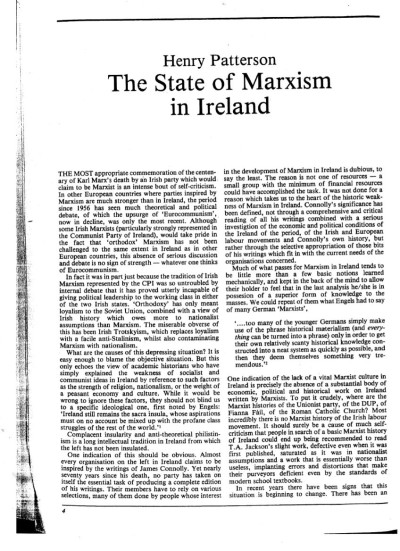
| Date: | 1983 |
|---|---|
| Organisation: | The Workers' Party |
| Publication: | Class Politics |
| Issue: | Number 1 |
| Author: | Henry Patterson |
| Type: | Article |
| View: | View Document |
| Discuss: | Comments on this document |
| Subjects: |
Please note: The Irish Left Archive is provided as a non-commercial historical resource, open to all, and has reproduced this document as an accessible digital reference. Copyright remains with its original authors. If used on other sites, we would appreciate a link back and reference to The Irish Left Archive, in addition to the original creators. For re-publication, commercial, or other uses, please contact the original owners. If documents provided to The Irish Left Archive have been created for or added to other online archives, please inform us so sources can be credited.
Commentary From The Cedar Lounge Revolution
17th December 2007
From another anonymous donation, and in view of the piece by Garibaldy from last week, here is an article by Henry Patterson, later of “”The Politics of Illusion”” fame, regarding Social Republicanism, about ‘The State of Marxism in Ireland’. It is taken from the 1983 “”Class Politics”” Journal, which had but one issue published. It’s an interesting piece, if only because it stakes out some territory for the line the WP would take during that period. It also has some fairly correct words to say about the nature of the WP, perhaps particularly…
“It is perhaps because that, unlike the CPI, the WP could not assume that because of its institutional links with the USSR and the international communist movement it was in a sense ‘naturally’ Marxist that it has had to being the process of constructing its relationship to Marxism, a process in which nothing can be taken for granted”.
Those of us present at the 1989 WP Ard Fhéis can certainly attest to the latter. But then one suspects at least part of the purpose of this essay is to burnish the Marxist credentials of the WP and dismiss those of the CPI. That may well be true, and one wonders what the significance of his comment that ‘since the 1950’s there has been a resurgence of critical thought in many communist parties… Unfortunately the Irish Communist Party is one of those least affected by these changes’… The 1950s, the 1950s… Now what happened in the early 1950s - say, taking a year at random, 1953 - that might have changed the nature of international Communism?
Another point he makes I think has enormous relevance to the further left in this period…
“Economism consistently exaggerates the automatically radicalising effects of economic crisis, and as it has no conception of political strategy - either bourgeois or socialist - underestimates what Gramsci referred to as the ‘organisational’ reserves of the bourgeoisie which can allow it to recover from what may appear to the economist as the ‘final death agony of capitalism’”
Although this warning sits oddly with a fairly valid point that ‘the upsurge in academic Marxism since 1968 did not result in much serious work on the key question of the nature and crisis of the British state’. Perhaps the unpalatable truth was (and is) that there was no ‘crisis’ of the British or Irish states, or at least none that was close to existential.
And yet his points about exaggeration and radicalisation are worth thinking about when some of the specific issues that he points to such as ‘irredentism’ as regards Articles 2 and 3, or indeed mass unemployment in the RoI, have faded into history.
More from The Workers' Party
The Workers' Party in the archive
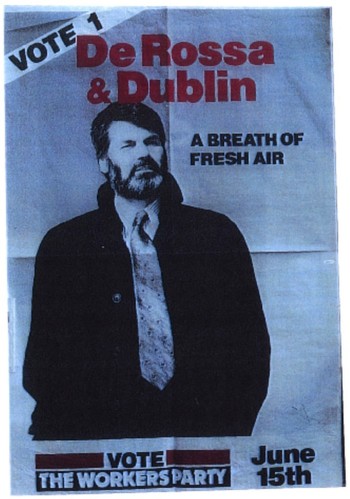
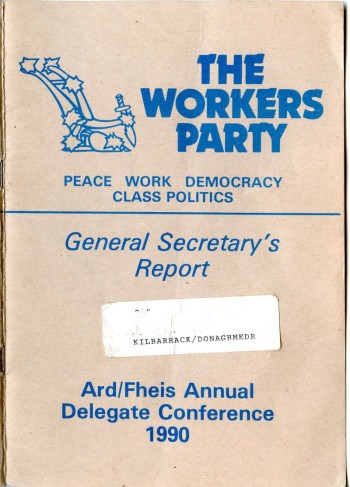
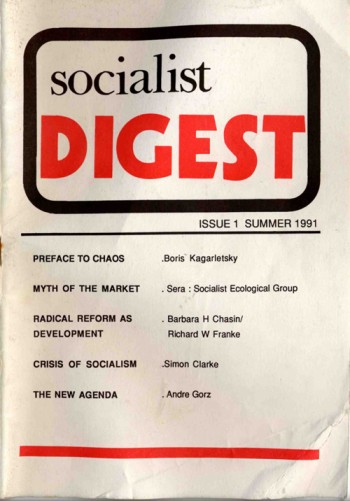
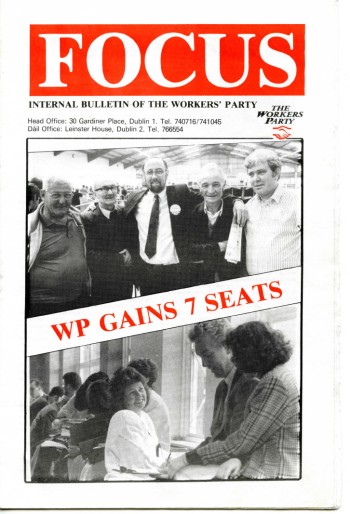
Comments
No Comments yet.
Add a Comment
Comments can be formatted in Markdown format . Use the toolbar to apply the correct syntax to your comment. The basic formats are:
**Bold text**
Bold text
_Italic text_
Italic text
[A link](http://www.example.com)
A link
You can join this discussion on The Cedar Lounge Revolution
By: Tom Griffin Mon, 17 Dec 2007 13:02:48
‘the upsurge in academic Marxism since 1968 did not result in much serious work on the key question of the nature and crisis of the British state’.
One obvious exeption would be Tom Nairn:
http://en.wikipedia.org/wiki/Tom_Nairn
Reply on the CLR
By: Garibaldy Mon, 17 Dec 2007 17:31:11
Excellent article in parts. I think he has Gramsci roughly speaking right, and he is also right to reject claims that The WP was economist, and point out how damaging the influence of nationalism has been – and continues to be – on the Irish Left. A fairly realistic hard-headed assessment of the need for political struggle and the democratisation of the south. Although I’m not sure his version of economism in Ireland at the time was right. It does make one wonder how much someone can change though.
Reply on the CLR
By: WorldbyStorm Mon, 17 Dec 2007 18:02:51
Tom, Nairn of course… and a great writer too.
Garibaldy, fair points. I still like, although generally disagree with his Politics of Illusion. An interesting piece, one way or another…
Reply on the CLR
By: Garibaldy Mon, 17 Dec 2007 18:35:48
Never had much time for Politics of Illusion. Much too dismissive of Connolly and the socialist tradition of republicanism, and written from the I’ve got the key to Marx perspective. Which makes reading it now even more entertaining.
Reply on the CLR
By: ejh Tue, 18 Dec 2007 07:51:39
Nairn of course… and a great writer too.
You are joking. Practically unreadable.
Reply on the CLR
By: WorldbyStorm Tue, 18 Dec 2007 07:56:34
Well, I was thinking of the conceptual side…ejh 🙂
Garibaldy, yep, that’s it precisely. What is he doing now?
Reply on the CLR
By: Garibaldy Tue, 18 Dec 2007 22:24:18
He’s working on unionism again now. Which is totally fair enough, as he will bring some economic aspect to the study. But he’s no longer writing in a Prolier than thou fashion. The second edition of Politics of Illusion was I thought a lot less than enlightening about the DL split, given his intimate knowledge thereof. I think he’s a bit more lost than Bew, having not replaced Marxism with the same commitment to unionism.
Reply on the CLR